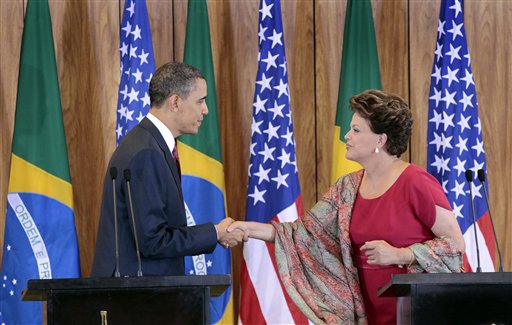
Backpedalling in Latin America for almost a decade, Washington hopes to respond to defiance by consolidating its hegemonic role in the region. Since the death of Chavez, the White House has implemented a number of economic, political, military, diplomatic and ideological initiatives.
On April 17, Secretary of State John Kerry expressed an important goal of American diplomacy before the House Committee on Foreign Affairs: Latin America is “our backyard, neighborhood, as you say. I think there are relationships we could improve.”
In 1991, George H.W. Bush launched a huge inter-American project for the post-Cold War era, the “Initiative for the Americas.” The idea was to build a large free trade area, expanding the NAFTA accord between Canada, the U.S. and Mexico to Tierra del Fuego.
Clinton and Baby Bush continued the neoliberal commitment to Free Trade Area of the Americas, but it was defeated in Mar del Plata as a result of the correlation of strengths and the appearance of an alternative program for Latin American integration.
The erosion that such a defeat signified, along with the pressing concerns in Afghanistan, Africa, China, Iraq, Iran and the Middle East, removed Latin America from the State Department’s focus of attention.
This oversight went on during Obama’s first term of office, allowing for the strengthening of the “Bolivarian Axis,” which gave rise to new integration scenarios surrounding ALBA, Unasur and CELAC* and increased the presence of China and other emerging outside powers.
As he begins his second presidential term, Obama is demonstrating the White House’s obvious interest by repositioning himself in the region. He has strengthened his strategy for retaking an area that was historically under U.S. influence by motivating business and financial relations with his southern neighbors.
He seeks to retake the diplomatic initiative, weakening his rivals in the region, especially the block of countries in ALBA, with Venezuela at the lead. The death of the Bolivarian leader who was the main driving force of the integration is a big opportunity for the U.S.
Washington moved a great number of chips with tremendous skill: Obama’s visits to Mexico and Costa Rica, Vice President Biden’s strategic visits to Brazil, Colombia and Trinidad and Tobago, the reception for the presidents of Chile and Peru in the White House, Kerry’s visit to Guatemala and the invitation to Dilma Rousseff to visit the U.S.
Support of the Pacific Alliance
Washington’s main allies propel this integration of the neoliberal matrix and related issues toward the Trans-Pacific Partnership, aiming for the destabilization of Venezuela by not recognizing the electoral victory of Nicolás Maduro.
The U.S. pushed Colombia to enter NATO and welcome opposition candidate Capriles, and also negotiated for the Drug Enforcement Administration to operate again in Argentina. Its diplomacy works intensely to reorganize the “backyard” after the turmoil that led to popular rebellions, the rise of anti-imperialist movements and the creation of integration courts aimed at regaining autonomy.
Since the end of the Cold War, Latin American nations haven’t tended to openly defy the agenda of the Department of State, which, angered by the challenges from the region, is now trying to put things in its favor. Promises of financial help, trade concessions, investments and academic exchanges traditionally coexisted with threats, destabilizations, economic sanctions and support for military coups.
In order to approve the Inter-American Treaty of Reciprocal Assistance in 1947 they offered a sort of “Marshall Plan” for Latin America. The Alliance for Progress was designed to obtain votes for the expulsion of Cuba from the Organization of the American States. The offers, free trade agreements, investments and financial aid for neoliberal governments in the region are used along with threats toward those who go against Washington’s interests.
The documents leaked by Edward Snowden reveal secrets that involve the U.S. and the U.K., which grant themselves legal authority to spy on all personal and trade communications of any global telecommunications system within their reach. It is irrelevant whether or not any of the data that’s intercepted has anything to do or not with terrorism or crime. The denounced spy network of the U.S. is spread out over all of Latin America, focusing on military issues, trade secrets, intellectual property, etc.
Dilma Rousseff, the president of Brazil, has decided to denounce the case before the United Nations on the eve of her first state visit to Washington, planned for Oct. 23, 2013, when she will be received by her counterpart Barack Obama in the White House. The region’s social movements and grassroot political forces warn of this new imperialist offensive.
* Editor’s note: Bolivarian Alliance for the Americas, Union of South American Nations and Community of Latin American and Caribbean States, respectively.

Leave a Reply
You must be logged in to post a comment.